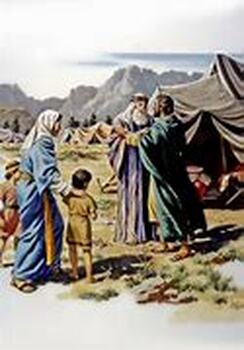It is amazing that right after the 10 Commandments, HaShem seems concerned with the treatment of slaves. These slaves were not like what we think of today as slaves, but rather were people who went bankrupt and worked their debts of. The Torah requires the treatment of 'slaves' to be so kind that HaShem had to make a provision in case the 'slave' did not want to leave.
אם־כסף תלוה את־עמי את־העני עמך
לא־תהיה לו כנשׁה לא־תשׂימון עליו נשׁך
"If you loan money to one of my people who is poor, you are not to deal with him as would a creditor; and you are not to charge him interest. (Exo 22:24)
To work, this commandment has to be balanced with Lev 19;12 and Ex 20:7 concerning the importance of fulfilling oaths/vows/promises, which in this case would concern the repayment procedure of a loan. Our Master taught us that it is better not to make a vow than to make one and break it! That concerns the repayment of loans such as credit card debt, mortgages, etc ...
FROM THE CHOFETZ CHAYIM:
It is an obligatory act, not merely a charitable act, to lend money. The reason the Torah uses the word, 'if', is because of the latter part of the verse. Only when you lend money are you forbidden to be a creditor. A person who borrows money spends it and if he is not able to pay it back when asked, you must not press him. If however you lend someone an object, that object remains in his possession and you are therefore permitted to demand its return. (Chofetz Chayim in Nesiv Hachesed 1:2).
When you lend someone money, you gain more from your act of kindness than the borrower does. The borrower is helped only in this world, while you gain reward in the world to come. (Kli Yokor on this verse).
The Chofetz Chayim seems to have taught exactly on the same line of the Master and the apostolic writers.
Rabbi Yeshua says,
When someone asks you for something, give it to him; when someone wants to borrow something from you, lend it to him. ...
"If someone asks you for something, give it to him; if someone takes what belongs to you, don't demand it back. (Luk 6:30)
And about not lending for interest and charging credit He said,
What reward do you get if you love only those who love you? Why, even tax-collectors do that! And if you are friendly only to your friends, are you doing anything out of the ordinary? Even the Goyim do that! Therefore, be perfect, just as your Father in heaven is perfect. (Mat 5:42-48)
About not pressing the borrower when he cannot repay he taught the following parable,
Because of this, the Kingdom of Heaven may be compared with a king who decided to settle accounts with his deputies. Right away they brought forward a man who owed him many millions; and since he couldn't pay, his master ordered that he, his wife, his children and all his possessions be sold to pay the debt. But the servant fell down before him. 'Be patient with me,' he begged, 'and I will pay back everything.' So out of pity for him, the master let him go and forgave the debt. "But as that servant was leaving, he came upon one of his fellow servants who owed him some tiny sum. He grabbed him and began to choke him, crying, 'Pay back what you owe me!' His fellow servant fell before him and begged, 'Be patient with me, and I will pay you back.' But he refused; instead, he had him thrown in jail until he should repay the debt. When the other servants saw what had happened, they were extremely distressed; and they went and told their master everything that had taken place. Then the master summoned his servant and said, 'You wicked servant! I forgave you all that debt just because you begged me to do it. Shouldn't you have had pity on your fellow servant, just as I had pity on you?' And in anger his master turned him over to the jailers for punishment until he paid back everything he owed. This is how my heavenly Father will treat you, unless you each forgive your brother from your hearts." (Mat 18:23-35)
Yeshua taught this parable as an answer to Peter's question:
Then Kefa came up and said to him, "Rabbi, how often can my brother sin against me and I have to forgive him? As many as seven times?" (Mat 18:21) To which the Master answered before going on to the parable:
"No, not seven times," answered Yeshua, "but seventy times seven!
(Mat 18:22)
The Master's prayer teaches us: "Forgive us our debts, as we forgive our debtors". (Mat 6:12).
In all this the Master took the cues from His Father. Due to our sin, each of us is indebted to the Father, but He doesn't press us for repayment. He waits for us to accept the Messianic deal He has set up for us. Justice has to be upheld for god to be called 'just', but very often the Father is seen as the judge in the following true story.
Two men who had been friends in their youth met years later in the police court of a great city, one on the judge's bench, the other in the prisoner's dock. Evidence was heard, and the prisoner found guilty. In consideration of their former friendship the judge was asked to withhold sentence.
'No,' he said. 'that cannot be; justice must be done and the law upheld.'
So he gave sentence: 'Fifty dollars fine, or fourteen days at hard labor.'
The condemned man had nothing wherewith to pay, so prison was before him. Then the judge, having fulfilled his duty, stepped down beside the prisoner, paid his fine, put his arm about him, and said, 'Now, John, you are going home with me to dinner.'
King David also believed in lending, as well as Solomon his son:
Things go well with the person who is merciful and lends, who conducts his affairs with fairness; (Psa 112:5)
He who is kind to the poor is lending to Adonai; and he will repay him for his good deed. (Pro 19:17)
The world's economy is in shambles. Industrial countries are seeing their middle classes disappearing in favor of a greater disparity between very few people becoming very rich and many people becoming very poor. Does that denounce our economic ways to HaShem?
It certainly does not reflect the way Hashem would have us run our finances. The Biblical financial system is made to prevent that kind of disparity. When people follow the economic systems laid in the Torah, including those concerning the 7th and 50th year jubilees, the fruit trees, the Shabbats, the tithes, the offerings, the firsfruits, the 'corners of the fields', etc..., it is impossible for someone to become ultra rich or ultra poor. The question is,
WHY DON'T WE DO IT?


 RSS Feed
RSS Feed